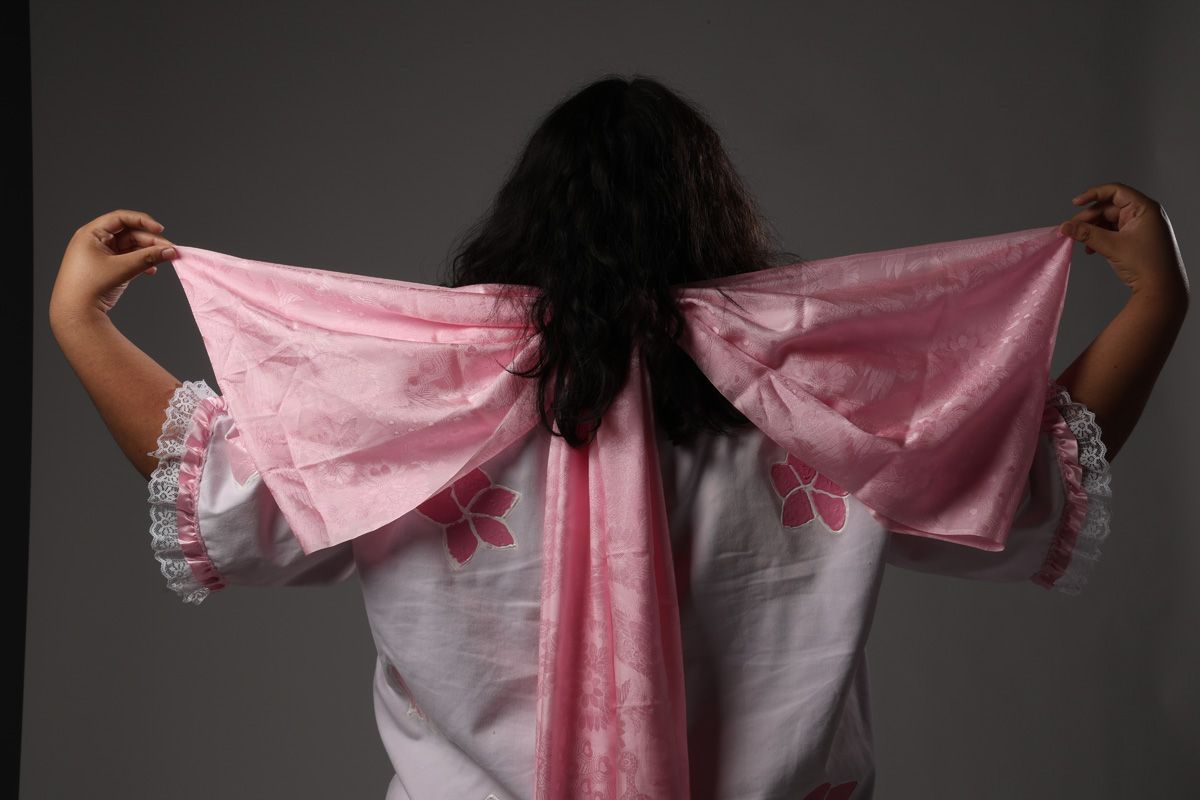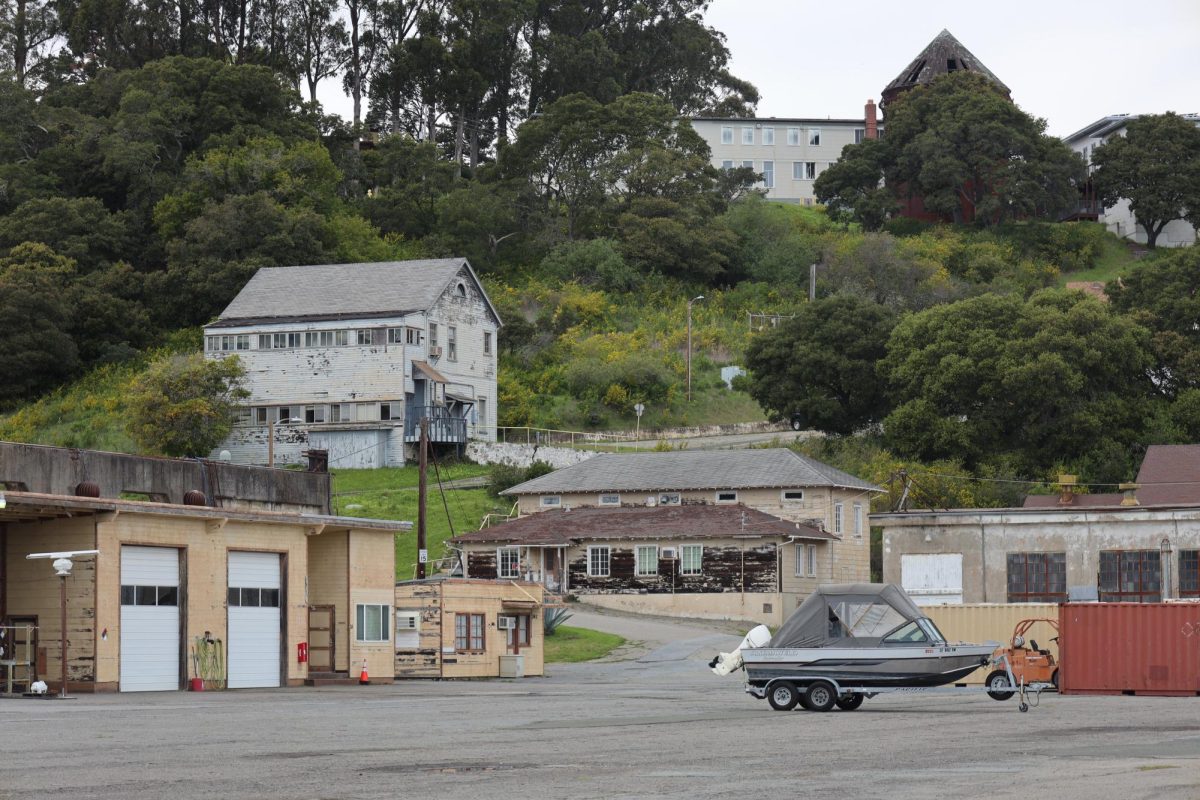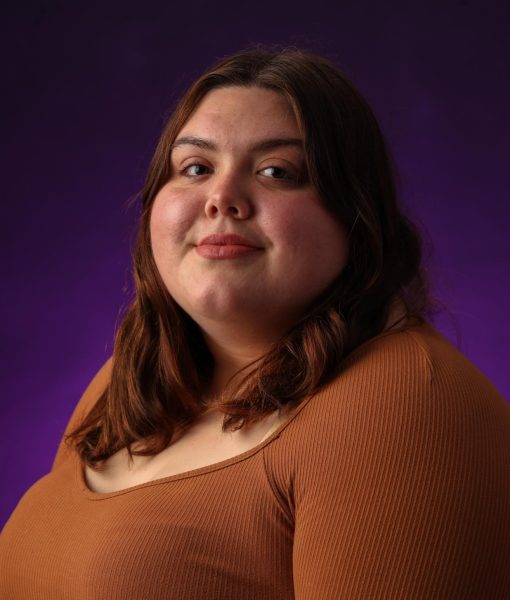In this episode of Gator Xpression, Editor-in-Chief Natalie Metcalf sits down with EROS Director Camila Hernàndez and EROS Assistant Director Gray Kirkl. Education and Referral Organization for Sexuality (EROS) is an Associated Students organization that provides sexual education to SF State students. With an office full of sexual education books, porn DVDs, condoms and lube, and a “titty” couch students can go to EROS to start their sexual journey.
Natalie Metcalf:
Hey guys, my name is Natalie Metcalf, the editor-in-chief of Xpress Magazine, and welcome to the first-ever episode of Gator Xpression, the culture podcast of SFSU. Today, we will be speaking with EROS.
Camila Hernández:
Hello. My name is Camilla. She/her. I am the EROS director.
Gray Kirkl:
Hey, baddies. I’m Gray. He/they, EROS assistant director, and I’m stoked to be here.
NM: Awesome. Well, thank you guys for coming. This is the first episode of Gator Expression. And basically, what we’re going to be doing on this podcast is talk about the culture on campus and the different clubs and organizations. This episode highlights you guys, highlights EROS. So, briefly tell me a little bit about what EROS is.
CH: EROS stands for Education and Referral Organization for Sexuality, and we are a sexual health student resource center on campus at the Cesar Chavez Student Center. And we provide safer sex supplies for students so they can come in and pick up free condoms, free lube, free dental dams, internal condoms. We have a bunch of different stuff that students can come and take for free. We have a sexual health library that has topics related to BDSM, to kink, relationships, sexual health, how to, how to bottom, how to top, how to do any sort of sexual thing.
We have that information. And we also have a referral database so that if students come in and they need help finding something, finding a service, finding a resource, we’re able to direct them to either on or off campus resources.
GK: It’s also like a hangout spot, to be honest. Like there’s so many cool resources that when people need abortion services, Plan B, pregnancy tests, Narcan, etc. and A through Z, about sexual health and sexual info.
But we have a cute little couch that people coming out on. We have little chairs, and I feel like it’s a really big community spot that people will just be passing through and then see how cute it is, how great Camilia decorated it, and they’ll just be interested and then come in and sit down, and then they’re then they’re going to be there for the rest of the semester.
Like it’s really that kind of spot that attracts like any type of person.
CH: We’ve definitely adopted people that just like went by, and like looked in like, ‘What is this?’ And now they come every week. We also have coloring books and stuff and different fidget toys. So students come in, they do their homework, they hang out.
Another big thing about EROS is we put on events. So we put on a lot of workshops and sexual health events that are informative or interactive. So, we hire people. We just had a rope and sensation play workshop today, where we had a sexual health educator come in and teach us how to do different knots. And we try to provide a safe space for students to learn those types of skills.
NM: How was that event?
GK: It was sick. It was so much fun. I feel like a lot of workshops can be like, really lecture-based. But this one was super interactive. They taught us how to do it, and then we all did it on ourselves. Or like a consenting homie next to us. And yeah, like we did, a full-body rope knot. What is it?
CH: Yeah. I don’t know what it’s called. It was a full body, like a rope harness.
GK: And then we did the lower legs. We did wrists. We learned about a little bit of electrocution.
Like soft electrocution, you know, like, super safe. Yeah. BDSM sensation, toys. Yeah, it was so great. Like, it was so much fun. Everyone was so stoked. Everyone was laughing and we all went away with, like, I feel like learning, like, six main different ways and hands-on techniques of how to do safe rope play.
CH: Yeah, the facilitator is name is Jamie Joy, and they did a really good job keeping it light and making everyone feel really comfortable and interactive. And it was really nice.
GK: Yeah, and it would be intimidating. We were saying damn like I’m not good. Like coordinated with my hands, and like can’t really follow through all these different steps.
But they were slow, direct, concise, and then they did it individually with people who wanted help to perfect it. It was great. I loved it, ten out of ten workshops for us, I think.
NM: I’ve always been super interested with your guys’ organization. I think it is so unique in the way that a lot of college campuses don’t have an organization like this. What do you think sets you apart from the other college campuses that don’t have this type of organization?
CH: I’ve been to SF State most of my educational career, so I don’t know what other people have, but I feel people that are transfer students, they do come by and they’re like, surprised. And they’re like, ‘Oh, I didn’t have this at my school.’ But I think it’s the fact that we’re just, so open about everything. Like we have dildos on display, we have vulva models, we have our titty couch. Like, we’re just, like, very open about discussing sexual health things.
GK: Yeah. It breaks down the taboo. So it’s like, what? What do you mean, a titty couch? It’s a blanket with titties on it, man. Yes, we know it’s like there’s a laughing, like little aspect to it, but it’s also just like breaking down, the discomfort that people get around it.
And actually, I’m that transfer student that came from other schools, plural, that didn’t have anything like EROS or even like a queer kind of spot. I went to Fullerton Community College, another community college that was Cypress Community College. I went to Cal State East Bay. They didn’t have anything like it. And that was the reason why I was going to transfer here.
Even though I made it to Cal State East Bay, I was like, I need the baddies, I need something that is like, I don’t know, a little more open and a little more free and of, community to express myself, I feel like that’s making community, being comfortable talking about things that maybe, general people aren’t comfortable with.
And I feel like EROS really offers that to students, and I’m just stoked that I found it because I was with students. I was walking by and I was like, ‘Thank God I found this spot.’
CH: Another thing about EROS is the fact that people, or the way that they’re shocked, I feel like they’re like, ‘Oh wow, you guys are so progressive. You’re so modern.’ But the organization is actually 52 years old. It was established in 1972. So this isn’t something new. It’s something that people have been talking about. And people yearn for this kind of space and for a space where they can have information that is readily available to them. And that is discussed in a non-judgmental way.
It’s important to have a non-judgmental space because generally I feel like, at least in San Francisco, we’re very lucky where people are definitely a lot more open when talking about things related to sexual health and sexuality.
But like overall in the US, it’s not really talked about; it’s like shame-based. It’s scare tactics, like you’re going to get pregnant, you’re going to get an STI. It’s immoral, all of these things. But the way that we format our space in the way that we talk about it, we want it to be open and not judgmental because we know when we acknowledge that sex, that pleasure, and all of these things are natural parts of the human experience and that shouldn’t be shamed.
GK: Then they can come here, they could talk about it. You know, we’re not therapists, but I mean, we’re a community. We’re like the same age. We’re saying, ‘We hear you, we see you, we feel you.’ There’s so many other people here that you can talk to and find that they have the same experience with you. And that’s why it’s so important. Like breaking down the taboos, breaking down the stigmas is…it’s relieving. It’s liberating. It’s healing.
CH: Because if you don’t feel comfortable talking about it, you’re not going to be comfortable finding, like, going to find help with whatever situation you have. And that makes you even more isolated. So knowing that there is somewhere that you can come and talk about it is really helpful.
NM: What kind of culture do you see here on campus?
GK: Hella gay. Hella queer. I think that honestly, when I came over here, I’m not from, like, a super red area. I’m not from a super, like, cis white area. I’m from the I.E. So definitely Latina-based. However, sexual health education was not something I ever came across. Sexual health education came from Tumblr.
And online, and that can be both helpful and also detrimental to young people. So, yeah, I feel like it’s like a privilege, like to an extent like to be from the Bay and specifically San Francisco to grow up around queer accepting and sexual health, like informative based, open people.
CH: The people that come in the most and become regulars are definitely queer folks. Well, EROS and QTRC (Queer and Transgender Resource Center) used to be one organization until it split off, so we have that history based in queerness. People have come in and asked how do I bottom and I –– as a non gay man –– I’m like ‘Okay, I have this book.’ In fact, I have five books that can talk to you about how to have a prostate orgasm or how to prep for bottoming. People of all orientations and all backgrounds do come in. So, it’s people that have maybe never spoken about sex or sexual health that openly, or like in school or at home. Maybe they’re from a more conservative background, they come in, and they might be nervous, but they still ask. They come in and just across that spectrum, people come in and they ask questions and hang out with us.
GK: Yeah, and I love that. I love our homies, you know, our queer bodies. It’s a lot of us there. But I also like really specifically love. And I’m like, I see this very kind of traditionally masculine dude. Come in. He sits down and he reads all our books. He’ll just open for a couple hours. He’ll just start reading through how to pleasure women, how to prioritize women, how to prioritize the femme body, etc., and he asks questions about us. Like you can ask me questions about HIV. And I think that’s fascinating. That’s really great to see, someone that’s not a part of our community be so open to it. And, yeah, prioritize it as part of, you know, normalizing.
NM: I think that’s really fascinating. Why did each of you decide to join EROS?
CH: Maybe a long story, but essentially I feel like in high school I got very interested in sexual health, especially because I had started to have sex, and I would go on YouTube and I would watch Laci Green, who’s this YouTuber. I don’t think that she makes videos anymore, but she would do sexual health videos and it would be really interesting about how to do different things, and no one would really talk about it around me or like, they’d be really, I don’t know, I feel comfortable talking to them about it.
So then I would go to the student health center at my high school and I would, like, sneak in and get some condoms. And I was like, I hope nobody sees me. And then when I was applying to undergrad, I was like, all of these majors sound really boring except for health education, which is about social justice and about being in community and explaining things in a way that’s accessible.
So I was really into that, and then I came here, and then I was actually an intern at EROS. Because I just wanted to be more involved. I saw all the kinds of events that they were doing, and I liked how open they were about sexual health. So I was an intern for a semester. And then I graduated, and then I came back, and then I saw that the position for director was open. So, I was like, okay, this is all I’ve really ever wanted to do. All I ever wanted to do is study sexual health and talk about sexual health and talk about sex. So I just came back.
GK: Yeah, we’re so glad that you did. You, yeah, you have made the Eros office, Eros community. People are so drawn to it. Camila, you did amazing. Like, this is your baby.
I joined Eros because sexual health is really important to me in my healing, for personal reasons, you know, and I’m just really glad to be in this space. And, yeah, I interned as well last semester in the fall, and I was like, I need to do this. I want to do this for the long run. I want to be in sexual health in different aspects of it, whether it’s kind of has aspects of like abolition, and harm reduction. That’s really important to me. And this is like a really big foundation to get there. So then I saw assistant director and snabbed it up.
And, I was really determined to get this, get this role because it’s just so amazing. I feel like I’m healing myself and gaining so much knowledge at the same time.





